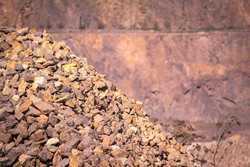Sustainable mining technologies to boost high tech industry
The key focus of the EU-funded EURARE project has been on achieving the sustainable domestic exploitation of rare earth elements (REEs). These elements – the 15 lanthanides, as well as scandium and yttrium – are vital in the manufacturer of high tech components for cars, computers and smartphones. Up until now though, industry has been heavily reliant on imports. This lack of a secure domestic supply means that industry is exposed to unforeseen shortages, price hikes and supply chain issues. This is why the EURARE project aims to establish a viable REE extraction and processing industry in Europe. Although REEs are not currently mined here, potential resources are known to be widespread. Tapping into these will be of significant long term benefit to Europe’s high tech sector, while reducing import-relating emissions and providing a boost for Europe’s domestic mining sector. The project recently carried out a demonstration drill for mineralised rock in Sweden. A 6.5 tonne sample was collected before being crushed, ground and magnetically separated. Around 1.9 tonnes of REE enriched mineral concentrate was recovered, along with some 3.7 tonnes of nepheline and feldspar by-product. The extraction of the REE enriched mineral concentrate demonstrated that domestic extraction is viable, while the recovery of nepheline and feldspar could also be of economic benefit. These industrial minerals have applications in a number of sectors such as in the manufacture of bathroom ceramics, roof and floor tiles, crockery, building fillers, paints, cement and even cosmetics. The next stage will be to scale up operations, with the eventual aim of gaining market approval for this by-product that until now has been considered as waste. The project team is confident that existing road and rail infrastructure near the Swedish test mine, along with proximity to large markets, will make commercialisation achievable. So far, the project has developed and trialled a number of new technologies designed to efficiently exploit European REE resources, with minimal impact on the environment. Starting with low-grade ore concentrates, two novel processes for the efficient recovery of REE metals or alloys have been tested, along with an innovative process for REE extraction and separation. A key advantage of the magnetic separation technique employed in Sweden is that it does not require any process chemicals. All activities comply with EU environmental legislation. In total, REE mineral deposits will be mined and treated at pilot plants in four different European regions. Concentrates produced, along with the red mud by-product from primary aluminium production, will be used in two processing pilot plants in Germany and Greece. The final products, REE compounds, metals and magnets will be evaluated by appropriate European end users. Despite their name, rare earth elements are – with the exception of the radioactive promethium – relatively plentiful in Earth's crust. However, because of their geochemical properties, REEs are typically dispersed and not often found concentrated in economically exploitable ore deposits. By applying cutting edge technology that makes use of all recovered raw material, the EURARE hopes to overcome this challenge and establish a viable European industry. The project is due for completion in December 2017. For further information please visit: EURARE project website(opens in new window)
Countries
Greece



